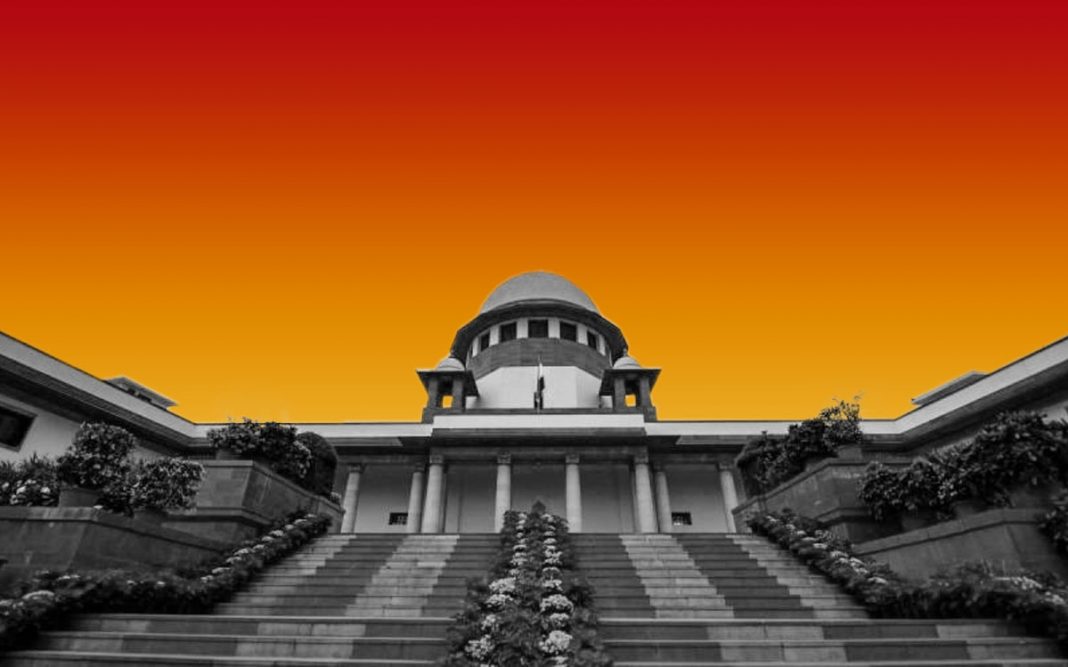The Constitution Bench of the Supreme Court will not hear the 19 petitions seeking legal recognition to same-sex marriages on Monday due to the unavailability of Justice Sanjay Kishan Kaul and Justice S. Ravindra Bhat.
Earlier on Thursday, Chief Justice of India D.Y. Chandrachud had directed the petitioners to finish the arguments by April 20 only, stating that it will hear the petitions seeking legal recognition of same–sex marriages in the same way as it heard the Ayodhya land dispute case, taking it up on Monday and Friday also.
The Constitution Bench of the Supreme Court comprising the CJI, Justice Sanjay Kishan Kaul, Justice S Ravindra Bhat, Justice P.S. Narasimha and Justice Hima Kohli commenced hearing on the petitions pertaining to marriage equality rights for LGBTQAI+ community.on April 18.
The CJI said in the coming week, the Apex Court will hear the case on Monday, Tuesday, Wednesday and Thursday. This Court will hear it without a break, he noted, adding that the top court of the country heard the Ayodhya case on Mondays and Fridays also.
Normally, the Constitution Bench does not sit on Mondays and Fridays.
After a lawyer representing one of the petitioners sought more time for arguments, the CJI said three days were enough, adding that the Supreme Court needs to hear the other side (Central government) in detail.
Justice Kaul said that they were only dealing with one aspect (If Special Marriage Act can be interpreted to allow same sex marriage). He asked the petitioners not to widen the ambit.
The CJI then observed that this was the reason why some of the earlier CJIs could not constitute a Constitution Bench. Five judges had to leave their regular work, he added.
When the matter was called out, Arundhati Katju said that she had submitted the list sequence of the Counsels appearing on behalf of the petitioners, along with their required time. At this juncture, the Bench indicated that the petitioners should conclude their side of arguments by today itself.
Dr. Singhvi submitted that the ultimate guiding star for the present batch of matters was the intention of statute, which was to provide the institution of marriage to all, irrespective of religious belief and permission. He further submitted that while enacting the statute, the Parliament could not have thought about homosexuals, but the society has evolved since.
He said the institution of marriage was very important and in order to provide a stable relationship, a same-sex couple should also be granted the same right of marriage. It was imperative to expand the scope of framework in order to assimilate this evolution, he added.
The Senior lawyer submitted that various provisions of the Special Marriage Act could be interpreted in a matter which recognised the same-sex couples.
Terming the 30-day notice and objection regime of the Special Marriage Act as unconstitutional, he said that such a regime was only peculiar to the Special Marriage Act, 1954 and directly struck at the right to privacy, autonomy and choice of the couple. He further submitted that this provision rather invited violence and was in contravention with the purpose of the Act.
Senior Advocate Ramchandran, appearing on behalf of the petitioners, namely Kajal (a Dalit woman, employed at a bakery) and her partner – Bhavana (belonging to OBC, from Bahadurgarh, working as an accountant), submitted that the issue at hand was not limited to the concerns of the urban elite as alleged.
He argued that marriage was not just a gateway to socio-economic privileges but also sometimes a societal protection from one’s own parental families. He submitted that couples such as the petitioners he represented did not have enlightened parents and thus, they have had to move to the Delhi High Court for protection orders.
In light of this, the notice and objection scheme contemplated under the Special Marriage Act needs to be done away with, he prayed, adding that a protocol be put in place on the lines of the one set out in the judgment of Shakti Vahini granting protection from the Khaap Panchayat.
He argued that a “separate but equal” argument that the Union has sought to put forward could not be countenanced.
The Senior Counsel submitted that the Union, in its counter-affidavit, had stressed the importance of procreation, arguing that as people in a same sex marriage cannot procreate, they need not be granted the right to marry. In response, he submitted that even many heterosexual females above the age 45 years may not be able to safely become pregnant, but were still allowed to marry. Therefore, procreation could not be a ground to deny the right to marry.
With respect to the Transgender Act, Vishwanathan showed a chart prepared by him depicting the types of combination of relationships that can be entered into and how they can be brought within the purview of the Special Marriage Act.
The arguments for the petitioners were led by Senior Advocate Mukul Rohatgi, assisted by Senior Advocates Saurabh Kirpal and Dr. Maneka Guruswamy, along with Advocate Arundhati Katju and a team of Advocates from Karanjawala & Co.
Solicitor General Tushar Mehta and Additional Solicitor General Aishwarya Bhati appeared on behalf of the Union government.
Senior Advocates Geeta Luthra, Anand Grover and Jayna Kothari represented other petitioners, who were still to argue.


